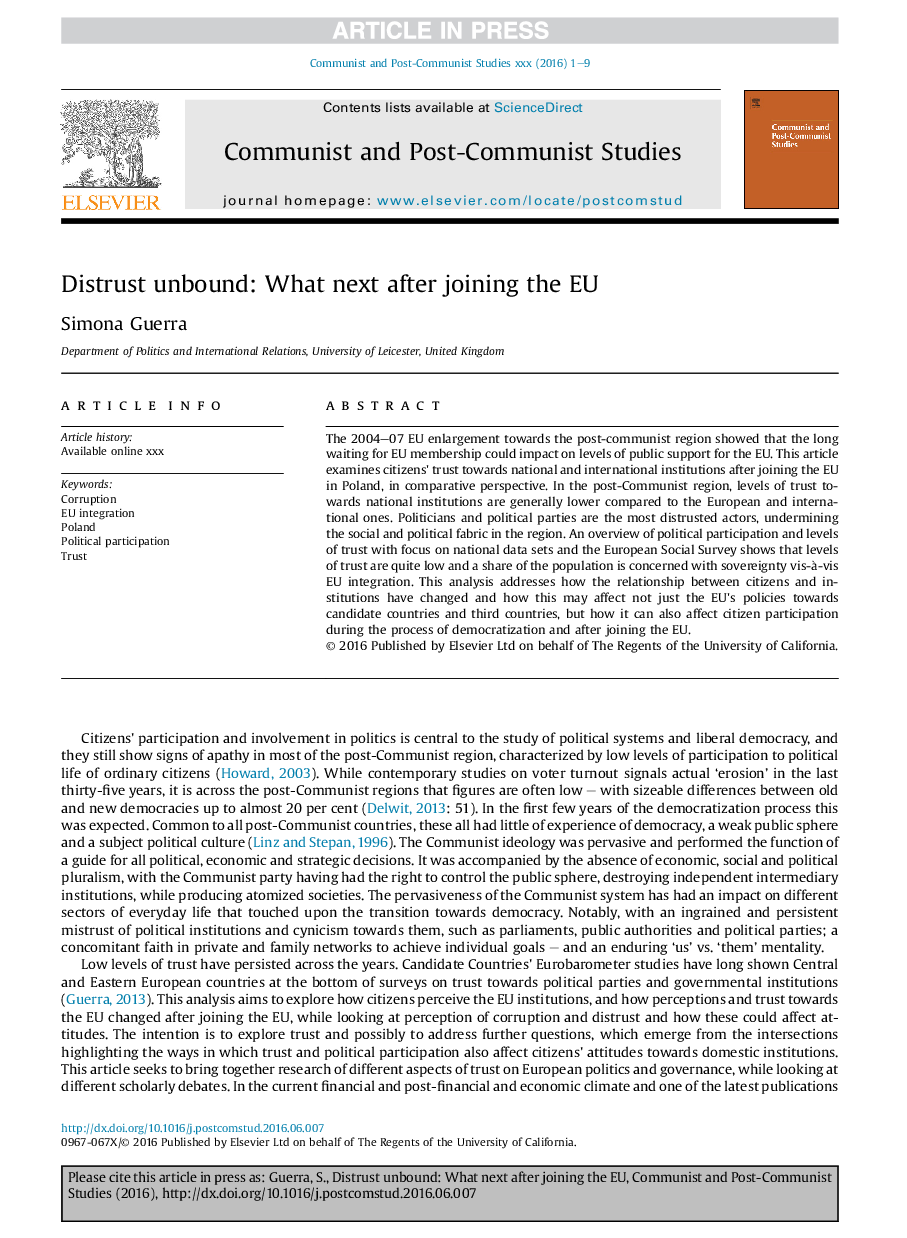| کد مقاله | کد نشریه | سال انتشار | مقاله انگلیسی | نسخه تمام متن |
|---|---|---|---|---|
| 5114287 | 1377982 | 2016 | 9 صفحه PDF | دانلود رایگان |
عنوان انگلیسی مقاله ISI
Distrust unbound: What next after joining the EU
ترجمه فارسی عنوان
عدم اطمینان غیررسمی: بعد از پیوستن به اتحادیه اروپا
دانلود مقاله + سفارش ترجمه
دانلود مقاله ISI انگلیسی
رایگان برای ایرانیان
کلمات کلیدی
فساد، ادغام اتحادیه اروپا، لهستان، مشارکت سیاسی، اعتماد،
ترجمه چکیده
گسترش اتحادیه اروپا 2004-07 نسبت به منطقه پس از کمونیست نشان داد که انتظار طولانی برای عضویت اتحادیه اروپا می تواند بر سطح حمایت عمومی از اتحادیه اروپا تأثیر بگذارد. این مقاله پس از پیوستن به اتحادیه اروپا در لهستان، با دیدگاه مقایسه ای، اعتماد شهروندان به موسسات ملی و بین المللی را مورد بررسی قرار می دهد. در منطقه پس از کمونیست، سطح اعتماد به نهادهای ملی عموما نسبت به اروپا و بین المللی پایین تر است. سیاستمداران و احزاب سیاسی از بازیگران ترین ناسپاس هستند و ساختار اجتماعی و سیاسی منطقه را تضعیف می کنند. یک مرور کلی از مشارکت سیاسی و سطوح اعتماد با تمرکز بر مجموعه داده های ملی و نظرسنجی اجتماعی اروپایی نشان می دهد که سطح اعتماد بسیار کم است و سهم جمعیت در مورد حاکمیت در برابر یکپارچگی در اتحادیه اروپا دخالت دارد. این تحلیل این است که چگونه رابطه میان شهروندان و نهادها تغییر کرده است و چگونه این نه تنها به سیاست های اتحادیه اروپا نسبت به کشورهای عضو و کشورهای سوم تاثیر می گذارد، بلکه چگونه می تواند مشارکت شهروندان را در روند دموکراتیزه شدن و بعد از پیوستن به اتحادیه اروپا تحت تاثیر قرار دهد.
موضوعات مرتبط
علوم انسانی و اجتماعی
علوم اجتماعی
توسعه
چکیده انگلیسی
The 2004-07 EU enlargement towards the post-communist region showed that the long waiting for EU membership could impact on levels of public support for the EU. This article examines citizens' trust towards national and international institutions after joining the EU in Poland, in comparative perspective. In the post-Communist region, levels of trust towards national institutions are generally lower compared to the European and international ones. Politicians and political parties are the most distrusted actors, undermining the social and political fabric in the region. An overview of political participation and levels of trust with focus on national data sets and the European Social Survey shows that levels of trust are quite low and a share of the population is concerned with sovereignty vis-Ã -vis EU integration. This analysis addresses how the relationship between citizens and institutions have changed and how this may affect not just the EU's policies towards candidate countries and third countries, but how it can also affect citizen participation during the process of democratization and after joining the EU.
ناشر
Database: Elsevier - ScienceDirect (ساینس دایرکت)
Journal: Communist and Post-Communist Studies - Volume 49, Issue 3, September 2016, Pages 233-241
Journal: Communist and Post-Communist Studies - Volume 49, Issue 3, September 2016, Pages 233-241
نویسندگان
Simona Guerra,
